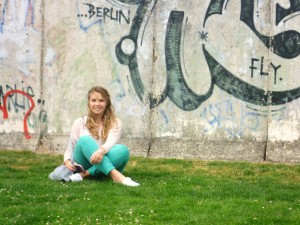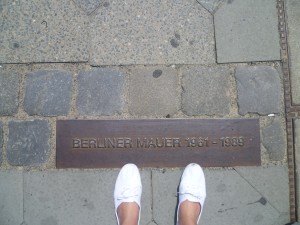Pre-departure:
In my second year I discovered the opportunity for going for a short study trip abroad too late. I would have had a week to prepare everything, which I found inadequate, since an application for such a chance provided by the university should take all your input effort. So as soon as the applications for the summer schools were open I commenced with my application. I decided to go during my June/July holidays, since it is summer in Europe, which means the days are longer and there is more to experience. The easiest part of the application process was of course filling out the application form, then updating my CV and writing a letter of motivation. I asked my lecturer who taught a course similar to the one I applied for in Berlin, for a reference letter. Making the clip was challenging but much more fun than I expected! When making the clip you should not set limits to your creativity and imagination, while keeping it simple and professional. When I received the e-mail of admission I was super excited. My course would consist of 3 weeks in beautiful Berlin. As soon as the International Office provided me with documents to fill out, I completed them, aiming for a soon flight booking.

While waiting for the travel bursary (which was very generous btw!), I e-mailed my friends and contacts I had in Germany to plan my trip – I wanted to extend my stay in that beautiful country by travelling around for 2 weeks before starting the summer school programme in Berlin. When everything was organised and the travel bursary transferred to my account, I went to Student Flights in the Neelsie. I recommend going as soon as possible, since flights are getting more expensive everyday you wait, for June/July is a popular holiday season in Europe. I found that the earlier you fly, the cheaper it will be. So I booked my flight right after my last exam for the beginning of June (although my summer school would only start towards the end of the month). The ticket price exceeded my travel bursary budget, maybe because I planned to arrive and depart at Frankfurt Int. instead of in Berlin. I also bought a Eurail ticket – a good investment if you want to travel to other places. For visa purposes I didn’t have to visit the German embassy in Cape Town. I still had a valid Schengenvisa from my trip to Europe in 2010. For preparation, I printed out all the documents and maps provided by Humboldt. I also loaded certified copies of my identification and travel documents on dropbox, in case something would get lost. I also printed out the public transport systems for the cities I would visit and carefully studied them. For me it was very important to organise the trip myself – it gave me confidence and a feeling that I had everything under control. It also made me a little proud of myself 🙂 Some useful links for the planning:
Useful Links:
Looking for flights: http://www.travelstart.co.za
Travelling within Europe: http://www.raileurope.co.za/train-tickets/rail-passes/
Travelling within Germany: http://www.deutschebahn.com/de/start.html
Public Transport in Berlin: http://www.fahrinfo-berlin.de/Fahrinfo/bin/
*there will always be an English option on German websites, so don’t hesitate to look around.
*download and print maps of the railway and subway systems provided
Summer School:
Upon arrival at the airport I immediately bought a sim card from the base shop (e-plus). I strongly recommend the Ortel package from e-plus if you want to stay in touch with home, as it includes low-cost call and sms rates to anywhere in the world. Through whatsapp my summer school “partner” from Stellenbosch and I arranged a time and place where we would meet at the Berlin Alexanderplatz train station to find our way to the apartments together. Our apartment was very (!) spacious and included modern furniture. We were lucky to be allocated together, with a girl from Russia. From the first day we became very good friends and throughout the stay we explored Berlin together. It took us 40 minutes to get from the apartment to the Humboldt University – we tried to arrive 15 minutes earlier to skype with our families via the university’s wifi. The international student organisation in Humboldt organised various activities for our course participants to get to know each other and to experience the different faces of Berlin together. Activities included a Biergarten visit, clubbing, rope course, museum visits, picnics and even a flea market visit. Our tutors were very organised, friendly and always accessible. Our class for the course “cities as centres of knowledge production” comprised 15 students from literally all over the world – most were Russian and Chinese. In the beginning we were given a thick reader from which we had to read a few reading in preparation for every class. Every second day of the week we had 3 to 4 hours of class (sometimes with a field trip) and used the days in-between to explore the city or to cover the readings for preparation. Our professor was the lecturer for the Masters programme in American Studies at the university and a very educates, open and wise man. We had a lot of vibrant discussions which he encouraged and we were welcome to speak our minds and opinions on everything. A freedom and a class atmosphere I’ve never felt in Stellenbosch. Here, we only attend a lecture, sometimes answer a question and then leave, whereas the summer school programme provided us the opportunity to debate and to become more self conscious in class. Since English was the second language for all the students there (except for the American), and since everyone comes from different parts of the world with different educational institutions, everybody felt encouraged and confident enough to contribute their personal views and experiences. I learned a lot; not only from the course itself, but also from the people and their different cultures. What I missed in the course was the attention for African affairs. It is no secret that our continent is ignored or neglected in most discussions by the international community. Although we could freely speak about our educational systems and other experiences we had in Africa, we sometimes missed the link to Africa, with which we could have associated ourselves with. I had mixed feelings when the summer school drew to an end: I knew I would miss my awesome flat mates, the late, long and entertaining subway trips, and the beautiful summer in Berlin. I took the train from Berlin to Frankfurt, from where I flew over Johannesburg to Windhoek, arriving on the farm completely exhausted. The long trip made me process the past five weeks, which have not really been relaxing holidays but rather a series of vibrant experience and lasting memories made.
Return:
I did not immediately return to Stellenbosch as I spent my last week of holidays on our farm in Namibia. Now, from Berlin city summer to farm life winter – THAT takes time to acclimatise! I have, however visited Germany before, so the return was not a huge difference from which I haven’t had already experienced. Of course I had to tell everyone how it was and what I did, but there was so much to talk about that I ended up saying: “Great. It was really great!” The memories I made and the impressions I’ve gotten cannot be explained in the same way as I experienced them. Also, I felt that the trip and the whole concept of participating in a summer school with so many students from all over the world, made me grow and become a little more adult 😉 Sometimes I was so enriched that I didn’t even feel the need to take photos, because I thought that this would never reflect what I just felt. There was no big cultural difference; because I am familiar with the German culture. What surprised me the most is how different German Germans are from me, a German Namibian, so that when I returned I gave a lot of thought to my descent and where I want to be in life. When I returned to Stellenbosch I felt different than when I left it. I’ve always felt homesick when leaving Namibia to Stellenbosch. This time was different. I believe I realised that it doesn’t matter where I was; I would always know where my roots are and would always return. Meanwhile, I was determined that when there would be another opportunity that would allow me to grow; I would immediately reach out for it. I’ve been so impressed by Humboldt’s structure of classes and open debates that when I came back to SU classes, I missed debating and supporting my viewpoint in front of a group. I missed the German food, especially the Turkish speciality: Döner – a MUST try! I also missed the German bureaucracy and the way everything in society was organised, which made it easy to rely on and trust people. I feel that South Africa can learn a lot from German discipline and professionalism. Everyone in Germany is willing to help and explain; administration work is done quickly and I never felt unsafe wherever I went. For a country that has undergone more than possibly any other country, in terms of political, social and cultural changes and historical hardships, Germany is the best example for an recovered, organised, healthy and professional state that is always looking forward – a perspective that some African states should try take on as well. After having been to one of the best universities in Germany, I am thinking about doing my Masters abroad – if possible, Switzerland or Germany. The competition is higher, the level of education is more challenging and the people are more professional in what they do and how they present themselves. I feel that a long-term study in Europe would be helpful, especially to escape our comfort zone we enjoy with the “Stellies vibe”, to personally grow and widen our horizons. It is important to see the differences between South Africa and Germany; where we are and where we can be. This trip was truly inspirational and was just what I needed as a prospective post-grad student.

